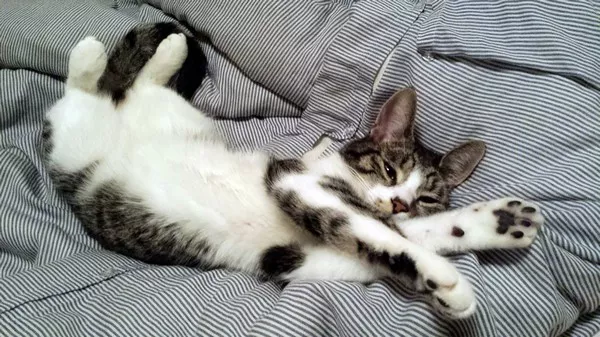Cats are creatures of habit, often exhibiting a preference for familiar environments and routines. Any disruption to their normal life can lead to noticeable behavioral changes. One such disruption is boarding, where a cat is placed in a facility away from its home for a period of time. While boarding can be necessary for various reasons, it can also be a stressful experience for cats, resulting in cat acting “weird” upon returning home after boarding. This article explores the reasons behind these behavioral changes, what to expect, and how to help your cat readjust to its usual environment.
Common Behaviors Observed After Boarding
Many cat owners report changes in their cat’s behavior after boarding. These changes can range from mild to severe and may include:
Withdrawal and Hiding: Cats might seek out secluded spots and spend more time hiding.
Aggression: Increased aggression towards humans or other pets can occur.
Vocalization: Some cats may become more vocal, meowing excessively.
Changes in Eating Habits: Cats might eat less or more than usual.
Altered Grooming Patterns: Over-grooming or lack of grooming can be signs of stress.
Litter Box Issues: Changes in urination or defecation habits, including not using the litter box.
Factors Contributing to Post-Boarding Behavior
Several factors can contribute to these behavioral changes. Understanding these can help in addressing and mitigating them.
Stress and Anxiety
The primary reason for behavioral changes is stress and anxiety. Cats are territorial animals, and being removed from their home and placed in an unfamiliar environment with unfamiliar smells, sounds, and sights can be overwhelming. The presence of other animals in the boarding facility can also add to their stress.
Disruption of Routine
Cats thrive on routine. Boarding can disrupt their regular feeding, sleeping, and play schedules, which can cause anxiety and stress. The lack of familiar human interaction can also be unsettling for them.
Sensory Overload
Boarding facilities can be noisy and bustling places. The constant noise from other animals, people, and the general activity can lead to sensory overload, causing cats to feel unsettled and anxious.
See Also: What Do You Need for An American Curl?
Health Issues
Sometimes, the change in environment and routine can lead to or exacerbate health issues. For example, a cat might develop a urinary tract infection or experience digestive problems due to stress. It’s also possible for cats to catch a cold or other illness from other animals in the boarding facility.
How to Help Your Cat Readjust After Boarding
Create a Calm Environment
When your cat returns home, creating a calm and safe environment is crucial. Ensure that they have a quiet space where they can retreat and feel secure. This space should be equipped with their favorite bed, toys, and a litter box.
Re-establish Routine
Try to re-establish your cat’s normal routine as quickly as possible. Consistent feeding times, playtimes, and cuddle sessions can help them feel more secure and reduce anxiety.
Provide Comfort and Reassurance
Spend extra time with your cat, providing comfort and reassurance. Gentle petting, talking softly, and being present can help soothe your cat and rebuild their sense of security.
Monitor Health
Keep a close eye on your cat’s health and behavior. If you notice any signs of illness or if their unusual behavior persists, consult your veterinarian. Health issues such as urinary tract infections, digestive problems, or respiratory infections should be addressed promptly.
Use Pheromone Products
Pheromone products, such as Feliway, can help reduce stress and anxiety in cats. These products mimic the natural pheromones that cats produce, creating a sense of calm and familiarity.
Slow Reintroduction to Other Pets
If you have other pets at home, reintroduce your cat to them slowly. This can help prevent territorial disputes and reduce stress. Supervise their interactions and provide separate spaces for each pet initially if necessary.
Preventing Stress During Future Boarding
Choose the Right Boarding Facility
Selecting the right boarding facility can make a significant difference in your cat’s experience. Look for facilities that offer:
Individual Accommodations: Private spaces where your cat can feel secure without direct contact with other animals.
Calm and Quiet Environment: Facilities that minimize noise and activity levels.
Experienced Staff: Trained staff who understand feline behavior and can provide appropriate care and comfort.
Visit the Facility Beforehand
If possible, visit the boarding facility with your cat before their stay. This can help your cat become familiar with the environment, reducing anxiety during their actual stay.
Provide Familiar Items
Leave familiar items such as your cat’s favorite blanket, bed, or toys at the boarding facility. These items carry the scent of home and can provide comfort to your cat.
Update Vaccinations and Health Checks
Ensure that your cat is up-to-date on vaccinations and has had a recent health check before boarding. This can prevent the spread of illness and ensure that any pre-existing health issues are managed.
Consider Home Boarding or Pet Sitters
If your cat experiences severe anxiety during boarding, consider alternatives such as home boarding or hiring a pet sitter. Home boarding involves leaving your cat in a home-like environment with fewer animals and more personalized care. Pet sitters can care for your cat in the comfort of your own home, maintaining their routine and environment.
Understanding the Long-Term Impact
Behavioral Changes
Most cats will gradually return to their normal behavior after a few days or weeks. However, in some cases, boarding can have long-term effects, especially if the experience was particularly stressful. It’s important to be patient and give your cat time to readjust.
Health Monitoring
Continue to monitor your cat’s health even after they seem to have readjusted. Some health issues related to stress may not appear immediately. Regular vet check-ups can help catch any delayed problems early.
Ongoing Anxiety and Stress Management
For cats that continue to exhibit signs of stress or anxiety, ongoing management strategies may be necessary. This can include:
Behavioral Therapy: Working with a veterinarian or a pet behaviorist to address anxiety and stress.
Environmental Enrichment: Providing a stimulating environment with plenty of opportunities for play and exploration.
Dietary Supplements: Certain supplements can help reduce anxiety in cats. Consult your veterinarian for recommendations.
Conclusion
Boarding can be a stressful experience for cats, leading to behavioral changes upon returning home. Understanding the reasons behind these changes and knowing how to help your cat readjust can make a significant difference in their well-being. By creating a calm environment, re-establishing routines, providing comfort, and monitoring health, you can help your cat return to their normal self more quickly. Additionally, choosing the right boarding facility and considering alternatives like home boarding or pet sitters can prevent stress during future boarding experiences. Always consult with a veterinarian if you have concerns about your cat’s behavior or health after boarding. With patience and care, your cat can overcome the stress of boarding and continue to thrive in their home environment.

























